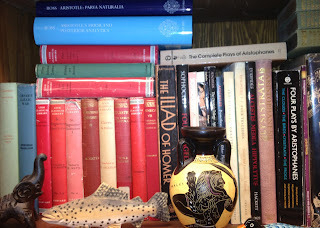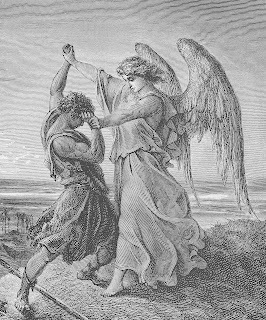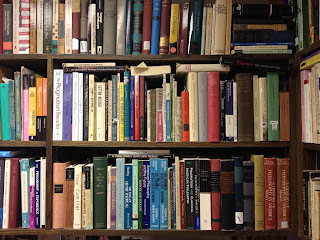Great Books
- Richard Russo, Straight Man. This is one that has been recommended to me so many times by so many people I finally bought it and read it. If you work in a small college humanities department, trust me: you'll feel at home in this book.
- J. M. Coetzee, Elizabeth Costello. This is another that was recommended to me. It takes the form of a series of lectures delivered by a novelist, with very little framing around each lecture. The lectures stand alone, but all together they give the picture of an artist at work trying to figure out what exactly she is doing, what she believes, and why. Coetzee is really a philosophical novelist, and he does a remarkable job of engaging directly with figures like Descartes and Kant and Peter Singer.
- Dave Eggers, How We Are Hungry. Eggers' short stories are like David Foster Wallace's, but less frenetic and wild and so a little easier to read. I love the genre, and I'm always fascinated by people like Eggers and Wallace who explore its edges. I don't love this book, but it has kept my attention as a kind of intellectual exercise, and it is like a garden filled with tiny blossoms that delight the eye when you slow down and look closely.
- Matthew Dickerson, The Rood And The Torc. Dickerson is a friend of mine and my co-author, so there's my disclosure. Now let me say this about Dickerson: there are good reasons why he's my friend and my co-author, and this book illustrates some of them. He's a natural, easy storyteller who makes you glad you kept turning the pages. His prose is light, disappearing from the eye, easily replaced with a mental image of the place and the characters. This is one of several novels he has written about the peripheries of Beowulf, a beautiful story about poetry, songs, medieval Europe, and the cost of making the right choices. Reading this book was the first time I felt like I could see medieval life, not just read about it. Homes and hearths come alive with smoke and roasting meat and moving songs; the Frisian landscape and the rolling sea and the smell of cowherds seem to lift off the pages and into my imagination as I read it. John Wilson is right: this is "a splendid historical novel." Dickerson is brilliant, and so is his prose.
-
Hunter S. Thompson, Screwjack. This is the book Carlos Castaneda would have written if he'd admitted he was writing fiction. You feel the intoxication, and you believe it.
- Herman Melville, Moby Dick. This is one of those books that everyone knows and nearly nobody reads. It is long, and full of words. Lots and lots of words. But wow. It is one of those rare books that gives me the sense that every sentence was the child of long and serious reflection. Reading this was like taking a really good class. Naturally, I bought myself a "What Would Queequeg Do?" t-shirt to mark this milestone in my life. You can get yours here.
- Nathaniel Hawthorne, Mosses From An Old Manse. And this is like Melville. You read it because at the end, you discover that what seemed to be a simple story about a simple thing makes you understand your world a lot better.
- John Steinbeck, The Moon Is Down. I love Steinbeck, so I bought this book not knowing a thing about it. Turns out Steinbeck wrote it as a propaganda piece. He wanted to give a picture of what it would look like to live in, say, Norway or Denmark under Nazi rule, and how that occupation could lead to resistance. What I love about Steinbeck is, more than anything, his desire to portray people with sympathy. The Nazis in his book are real people, believable, and even likeable. I wish we had more people able to portray our contemporary enemies with such sympathy. If we could do so, we could love them better, and I think we could better understand how to resist them. As a bonus, towards the end of the novel there is a prolonged reflection on the meaning of Plato's Apology of Socrates.
- Patrick Hicks, The Commandant of Lubizec. (Another disclosure: Hicks is also my friend.) I was pretty sure I'd read all I needed to read about the Holocaust. I grew up with survivors. I've read all the usual books, I teach several in my classes. I didn't want to hear any more. But Hicks has done something truly remarkable in this fictionalized account of Operation Reinhard. In fact, what he's done is similar to what Steinbeck does: he has written about people with real sympathy and insight. It's a hard read because he spares us nothing, but that's precisely what makes it such a good read. Here's a short video about the book:
- Virginia Woolf, Mrs. Dalloway. (Mixed feelings about this one. My mind enjoyed it more than my aesthetic sense did, if that makes sense.)
- John Steinbeck, Cannery Row and Of Mice and Men. (I discovered Steinbeck late in life, thanks to a friend's recommendation. I've also recently read his Log From The Sea of Cortez and Travels With Charley In Search Of America. I think these two will forever shape me as a writer.)
- Graham Greene, Our Man In Havana, The Quiet American, The Honorary Consul, Travels With My Aunt, The Power And The Glory. (I will let the number of titles speak for itself.)
- Alan Paton, Cry, The Beloved Country. (I was surprised by how contemporary this old book felt, and by how relevant to America an African book could feel.)
- The Táin. Because I have a thing for reading really old books, and this is one of the oldest from Europe.
- China Miéville, Kraken. (London. Magical realism. Bizarre and witty.)
- J. Mark Bertrand, Back On Murder (I don't read many detective novels, but I really enjoy Bertrand's prose.)
- Cormac McCarthy, The Road. (The final lines spoke to my salvelinus fontinalis -loving heart.)
- David James Duncan, The River Why (I've re-read this one a few times. If you like trout and philosophy, you might like this book.)
- Mary Karr, Lit. (Third in a series of memoirs. Some of the best storytelling I've read in a long time. Brilliant insights into addiction, love, and prayer.)
Reading Thucydides
Last year I led an online discussion of Thucydides. It stopped when I got busy with other pursuits. Thinking of starting that up again, with two tracks: One group that starts at the beginning of Thucydides; another that picks up where the first group left off and reads all the other texts written in the context of the Pelopponesian War.
Addendum: I’d like at least one of these groups to meet in a quiet library, or an internet-free cabin in the wilderness, or some other place where we would be uninterrupted, could talk face-to-face. The feel of paper in our hands, pens and notepads on the table. The smell of books. A shared meal, and glasses raised in salute of good questions, thoughtful insight, words that call for moments of silent reflection.
No grades, no reporting afterwards. Just better familiarity with ideas that have changed our world, and, best of all, new friends.
More Books Worth Reading
Even so, one of the great surprises of being a teacher is that, at the end of a long day of work reading, I like to unwind with a good book. Go figure.
The last few months have brought me a surfeit of good books to unwind with. Here are some of the recent books I've enjoyed:
Books Worth Reading
I'm reluctant to make book recommendations because I think what you read should have some connection to what you care about and what you've already read. In general, my recommendations are these:
First, I agree with what C.S. Lewis once said:* it's good to read old books. Old books and books written by people who are not like us have a remarkable power of helping us to see the world with fresh eyes.
Second, let your reading grow organically. If you liked a book you read, let it lead you to the next book you read. Often, books name their connections to other books. Or authors will name those connections, dependencies, and appreciations. The first time I read Lewis's Out of the Silent Planet, I missed the fact that the preface named H.G. Wells and that the afterword referred to Bernardus Silvestris. When I read it again as an adult, I caught those obvious references and let them lead me to other books.**
Third, I recommend learning the classics. That's an intentionally vague term, and I use it to mean that it's good to know those books that have given your culture its vocabulary. People who have stories in common have enriched possibilities for conversation. One of my favorite Star Trek episodes explored this idea, and it appealed to me because I believe that it's not far from how language really grows. If you need a place to start, check out one of the various lists of "great books" floating around out there. For instance this one, or this one.
With all that being said, if you're still interested in what I'm reading, here are some older titles I've enjoyed in the last year or so:
* Lewis said this in his introduction to Athanasius' On The Incarnation (which, by the way, is now available from SVS Press in a dual-language edition, Greek on one page, English on the facing page.)
** There are two excellent books on Lewis' "Space Trilogy" or (as I think it should be called) "Ransom Trilogy": This one by Sanford Schwartz, and this one by David Downing.
Great Books, Pedagogy, and Hope
About fifteen years ago I enrolled in the "Great Books" M.A. program at St John's College in Santa Fe, New Mexico. It was one of the best decisions I've ever made.
Much as I appreciate my undergraduate education, too often it rewarded me for concealing my ignorance and emphasizing what I already knew. The problem, of course, is that my ignorance was thus shielded from the sterilizing sunlight of others' scrutiny and instruction.
Confessing Our Ignorance
Matthew Davis, my tutor and advisor at St John's, won me over to another way of viewing literature when, on one of the first days we met, he pointed to a passage in Plato's Republic and said "I have always wondered what Plato means by that." Looking up at the class, he asked, "Do any of you have any ideas about what he might be trying to say?"
Mr. Davis is the first professor I recall who openly confessed his ignorance, and who thereby modeled what it means to open oneself to the instruction of a great text. Not much has shaped my academic life as much as that.
Grappling With Classic Texts
As I have begun to mature into my own place as a teacher, I often think that this is the best thing I can give my students: not professorial and authoritative descriptions of texts, but an example of what it means to be a student. I can try to be an example of someone who sits with texts and listens to them, grappling with them, like Jacob with the angel or like Menelaus with Proteus: persistently grappling with my superior and refusing to let go until I receive a blessing. (Selah.)
For the last few years I have been seeking out and reading classic novels. As I read them I feel like an apprentice architect touring buildings, looking not just at the outward form and function but looking for the supporting structure, trying to notice the decisions the artist made about what to include and what to omit.
Along the way, I have begun trying to write bits of dialogue, scenes, characters, and other elements of fiction. I'm not trying to write a novel so much as trying to perform experiments the way high school science students do in labs: not to discover something new but to learn haptically, kinesthetically, experientially what the masters already know. I can't say that I've learned to write novels, so don't expect anything from me there. But as I've paid attention, I feel I've begun to squeeze some blessings out of the books, including some unexpected ones.
I've noticed, for instance, that Craig Nova writes about the olfactory sense in a way that makes me notice aromas I never noticed before. John Steinbeck has begun to make me care more about friendship, and about the people in front of me. Harold Frederic has me rethinking my early faith, and this is helping me look ahead as I try to nurture it into a faith worth having. Novels are helping me see the world differently.
So What Does This Have To Do With Hope?
I just finished Graham Greene's The Honorary Consul. Apparently this was Greene's favorite of his own works, and I can see why. Like many of the really good novels I've read, it has left me thinking about a range of topics, and longing for someone to talk about it with.
Which brings me to hope. I started reading Greene because Bill Swart, my friend and colleague, told me about how good Greene's novels are. Bill was right about this, so I sought him out the other day to talk more about Greene. We said too much to cover it all here, but Bill said something I can't bear not to repeat. When we began discussing Greene's The Power and the Glory, Bill said "That book gave me hope that my own self-perception might be wrong."
If you know the novel, you know why, because you know how Greene's characters wrestle with being both sinners and saints. If you don't know the novel, let me recommend it to you.
We Should Keep Teaching And Reading Fiction
I still have a lot to learn about novels. I doubt I'll ever write one - or a good one, anyway. But I'm delighting in reading them. Perhaps that's why they matter so much: they delight us, and capture us. When I'm in a good book I feel like I'm really in it. I stop seeing words on a page and start seeing, with some inner eye, the world the novelist sees.
And like all my other travels, journeys into fiction leave me a different person. I see different possibilities, I see -- and smell -- my world differently. I know it's important to teach young people to read non-fiction, but teaching fiction might be for them what The Power and the Glory was for Bill: a tonic for his soul, a sweet drink of hope that didn't just entertain, but that allowed him to envision his life, his work, and his purpose in an entirely new way.


